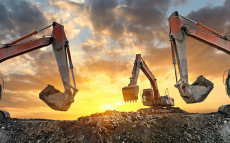- pathfindersAI
- Job Profile
Industrial Truck and Tractor Operators
Summary
Career Navigator: Industrial Truck and Tractor Operators
What They Do
Industrial Truck and Tractor Operators are integral components of the logistics and manufacturing industries. These professionals adeptly handle and operate equipment such as forklifts, tractors, and other industrial trucks to transport, lift, and position materials within warehouses, factories, construction sites, and docks. Their expertise ensures that goods move efficiently through the supply chain, contributing to the smooth operation of businesses. By maintaining an organized and continuously flowing environment, they play a vital role in minimizing delays and optimizing productivity.
Job Responsibilities
The day-to-day responsibilities of Industrial Truck and Tractor Operators are diverse and require meticulous attention to detail. One primary duty is the safe and accurate operation of various industrial vehicles. Operators meticulously move materials to and from storage areas, loading docks, delivery trucks, and production lines. They are responsible for verifying the contents and stability of loads to prevent accidents and ensure safe transport. Additionally, they must maintain their equipment by performing routine checks and minor repairs, reporting any significant issues to maintenance personnel. Another key responsibility includes keeping detailed records of material movements, a critical task that supports inventory management and helps identify potential discrepancies.
Essential Skills
Proficiency in operating industrial vehicles is undoubtedly essential, but it is not the only skill paramount to success in this role. Operators need to have a keen eye for detail and possess strong spatial awareness to maneuver in sometimes tight or cluttered spaces. Physical stamina and strength are also crucial, as the job often requires lifting heavy materials and long periods of standing or operating machinery. Furthermore, they must be adept in basic mechanical skills to carry out equipment maintenance and minor repairs. Effective communication is also vital, as operators frequently interact with other members of the logistics and manufacturing teams to coordinate activities and ensure safety standards are upheld.
Educational Pathways
While formal education requirements for Industrial Truck and Tractor Operators are relatively minimal, a high school diploma or equivalent is typically preferred by employers. To increase employability and proficiency, prospective operators may seek training programs that offer certification in forklift and industrial truck operation. Such programs are often available through community colleges, vocational schools, or professional training organizations. These certifications often include both classroom instruction and practical, hands-on experience, ensuring candidates are well-versed in safety protocols and operational techniques. Some employers might also offer on-the-job training for new hires, allowing them to become familiar with company-specific equipment and procedures.
Career Prospects
The demand for skilled Industrial Truck and Tractor Operators remains steady, driven by the constant need for efficient logistics and material handling in numerous industries. The U.S. Bureau of Labor Statistics projects a stable growth rate for this occupation, ensuring continuous opportunities for employment. Furthermore, experienced operators may advance their careers by transitioning into supervisory or training roles, or by specializing in the operation of specific types of machinery. Competitive wages and the potential for overtime work make this career financially rewarding as well.
Conclusion
In conclusion, Industrial Truck and Tractor Operators play a pivotal role in ensuring the smooth and efficient movement of goods within various sectors. Their responsibilities are diverse, demanding not only operational proficiency but also physical stamina, attention to detail, and effective communication skills. While the educational requirements are accessible, pursuing specialized training can significantly enhance one’s employability and job performance. With stable career prospects and opportunities for advancement, this occupation is a viable and rewarding path for those interested in contributing to the realm of logistics and material handling.
Video
Compensation
| State | Median Salary | Median Hourly | Positions |
|---|---|---|---|
| AL | 41,500 | 19.95 | 17,070 |
| AK | 49,020 | 23.57 | 610 |
| AZ | 45,350 | 21.80 | 16,240 |
| AR | 38,470 | 18.50 | 10,130 |
| CA | 46,980 | 22.59 | 96,680 |
| CO | 46,620 | 22.42 | 8,250 |
| CT | 45,660 | 21.95 | 2,430 |
| DE | 57,200 | 27.50 | 6,880 |
| DC | 60,940 | 29.30 | 130 |
| FL | 39,860 | 19.16 | 31,850 |
| GA | 42,020 | 20.20 | 58,510 |
| HI | 60,940 | 29.30 | 790 |
| ID | 43,860 | 21.09 | 2,260 |
| IL | 45,090 | 21.68 | 29,210 |
| IN | 43,570 | 20.95 | 29,330 |
| IA | 44,410 | 21.35 | 8,360 |
| KS | 46,140 | 22.18 | 8,780 |
| KY | 44,600 | 21.44 | 12,310 |
| LA | 43,660 | 20.99 | 5,760 |
| ME | 46,270 | 22.25 | 2,670 |
| MD | 42,300 | 20.34 | 11,000 |
| MA | 46,480 | 22.35 | 7,080 |
| MI | 42,830 | 20.59 | 25,090 |
| MN | 47,280 | 22.73 | 7,380 |
| MS | 38,350 | 18.44 | 8,580 |
| MO | 43,120 | 20.73 | 14,250 |
| MT | 46,140 | 22.18 | 1,060 |
| NE | 44,260 | 21.28 | 5,020 |
| NV | 44,780 | 21.53 | 4,430 |
| NH | 50,870 | 24.46 | 1,330 |
| NJ | 44,370 | 21.33 | 18,270 |
| NM | 52,200 | 25.10 | 2,720 |
| NY | 49,420 | 23.76 | 19,850 |
| NC | 39,190 | 18.84 | 23,460 |
| ND | 43,480 | 20.90 | 860 |
| OH | 43,790 | 21.05 | 38,350 |
| OK | 44,350 | 21.32 | 8,660 |
| OR | 48,190 | 23.17 | 8,230 |
| PA | 46,210 | 22.22 | 44,430 |
| RI | 45,900 | 22.07 | 360 |
| SC | 40,410 | 19.43 | 13,830 |
| SD | 44,460 | 21.38 | 1,650 |
| TN | 38,400 | 18.46 | 19,130 |
| TX | 42,460 | 20.41 | 83,960 |
| UT | 46,070 | 22.15 | 7,110 |
| VT | 43,640 | 20.98 | 680 |
| VA | 46,940 | 22.57 | 18,940 |
| WA | 47,720 | 22.94 | 16,730 |
| WV | 39,180 | 18.84 | 2,040 |
| WI | 45,640 | 21.94 | 15,400 |
| WY | 52,540 | 25.26 | 780 |
Similar Occupations
In this area you will find other occupations that are close to the one you were viewing in tasks, knowledge and work environment. If the primary job profile you are viewing isn't quite to your liking, take a look around and see what else is available.
Basic and Premium Accounts have more alternative occupations available than the Free account.

Crane and Tower Operators - 53-7021.00
Crane and Tower Operators are responsible for controlling and maneuvering cranes and tower equipment to lift, move, and position heavy materials and objects at construction sites, docks, and industrial facilities. They ensure safety protocols are followed while coordinating with ground crews to execute precision tasks efficiently and accurately.
-
$64,690/yr
Median Pay -
42,260
Number of Jobs

Excavating and Loading Machine and Dragline Operators, Surface Mining - 47-5022.00
Excavating and Loading Machine and Dragline Operators in surface mining operate heavy machinery to remove overburden, extract minerals, or load materials onto transport vehicles. They ensure efficient operation and maintenance of the equipment while adhering to safety protocols and environmental regulations.
-
$50,050/yr
Median Pay -
32,630
Number of Jobs